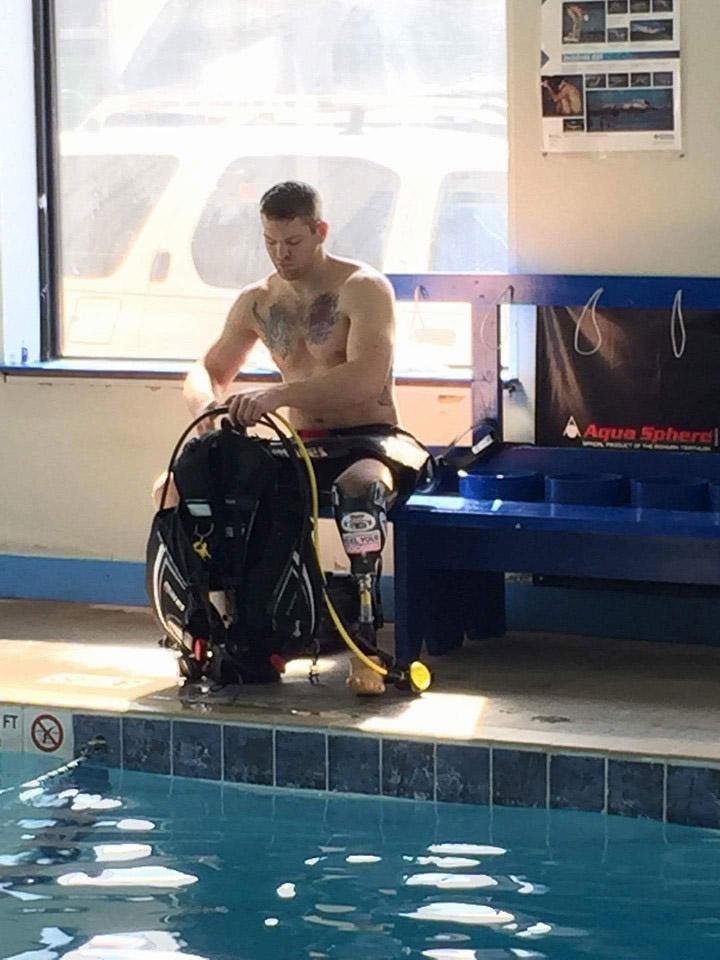What stands out to those who scuba dive with Cody Johnson isn't that he's missing most of his left leg; it's that he's a strong swimmer.
It's the ex-Marine's outlook despite a string of misfortune that would challenge the sanity of the greatest optimist.
Bad ankles forced him to leave the military in 2011, derailing what he thought would be a long career serving his country overseas. Three years later, the blast of a single-shot Remington .270 tore off his left leg from just below the knee.
"It felt like a dream, but I kept waking up and it wasn't," said Johnson, 25, of Bigelow. "Part of me is still thinking I'm going to wake up from a bad dream."
Recently though, the dream has improved. In February, instructors at the Dive Shop II in Little Rock began certifying Johnson to scuba dive. Through the Dive Pirates Foundation, a Houston-based nonprofit, he received scuba gear, free lessons and a diving trip to the Caribbean next month.
Last month, he was introduced to the world of the Paralympics and the doctor who designed the running prosthetics for South African Olympian and double-amputee Oscar Pistorius. The doctor, Francois Van Der Watt of Fort Smith, will design a similar "blade" for Johnson, who plans to start competing in track and field events in the next few months, hoping for a berth in the 2020 Paralympics.
At first, Johnson thought opportunities like these were lost with his leg. Instead, the loss of his leg opened up a world of new ones.
"He's truly amazing," Terri Bernard, Johnson's scuba instructor, said.
"I have great admiration for him not letting anything stop him," Kevin Sauer, Johnson's dive buddy and fellow veteran, said. "I wouldn't be surprised to see him on the speaking circuit."
At first, Johnson appears shy, but he quickly opens up and with his dry sense of humor recounts the day he lost most of his leg.
It was Sunday, Aug. 17, 2014. Like every Sunday, his plan was to watch football and clean his gun over a few beers. Unlike dozens of Sundays before, something went wrong.
Wearing a pair of United States Marine Corps shorts, Johnson describes every detail of the day he shot his own leg.
The day of his accident, his guns were laid out in his living room when he went to his bedroom to retrieve the cleaning kit and one last gun. As he bent over to grab the cleaning kit, the rifle malfunctioned.
Between the gun's blast and the special round designed to expand upon impact, most of his left leg from the knee down was gone. His foot dangled, attached only by the skin.
"I found out those bullets worked pretty well though," Johnson deadpanned.
After applying a makeshift tourniquet, he hopped to the house next door where neighbors called 911. By the time he got to the hospital, he had lost almost 7 pints of blood -- more than half the blood in a man his size and age.
He never lost consciousness, amazing doctors who told him he was lucky he survived.
"It was like watching a black-and-white movie without sound," Johnson said.
Johnson's mother and stepfather were scuba divers when Johnson was young. He hoped to learn to dive as well, but he never got around to it. Johnson thought he lost hobbies like scuba diving after losing his leg.
The Dive Shop II and the Dive Pirates Foundation gave him that hobby back, but they gave him more than that.
"I hear it at the gym a lot; people will come up and say I've inspired them," Johnson said. "It's encouraging, but that feeling doesn't touch the way this place has made me feel. It's one of the friendliest environments."
Johnson's instructor stopped him there.
"He's our family," Bernard said.
The Dive Pirates Foundation, which has 34 chapters in the U.S., hopes to make lifelong divers of its disabled students. The Dive Shop II chapter started in 2012, and it recently completed the most successful fundraiser in its short history.
The foundation instructs mostly disabled veterans, but it also serves civilians who are blind or have other mobile disabilities. Unlike similar groups, Dive Pirates can train divers who otherwise need wheelchairs to get around. Most recipients become classified divers, meaning they must dive with specially trained divers who can do the necessary tasks they're unable to do themselves. Johnson, however, will receive the same certification as regular divers.
"The only thing that's different about Cody is he's a new diver; he's not experienced like the other guys I dive with," Sauer, Johnson's dive buddy, said. "But he's a great swimmer, and he'll get there."
Johnson's certification will culminate with a dive off the Cayman Islands alongside Sauer and others in June.
Then it's on to the next challenge for Johnson, who wants to compete in the Tokyo Paralympics in 2020. He plans to quit his job as an auto mechanic in a few weeks to start training and racing. That's in addition to finishing his degree in electrical engineering.
The biggest hurdle won't be physical, Johnson said. Financing school and training will be tough.
He created a crowdfunding page that has already received $1,000 of his $10,000 goal, some of which he plans to donate to charities that help people like him.
"You don't know what you can do until you try," he said. "I wouldn't invest what I am about to if I didn't think I could do it."
It's that determination that inspires seemingly anyone Johnson meets, whether at the dive shop or the gym.
Metro on 05/23/2016
